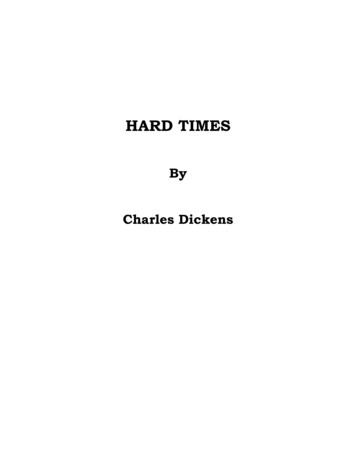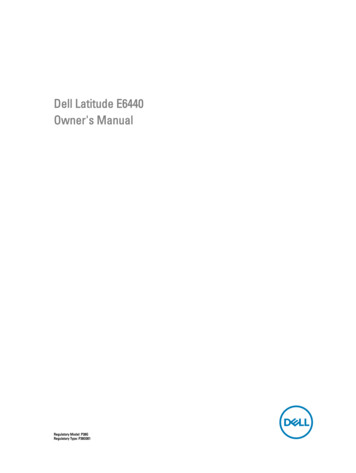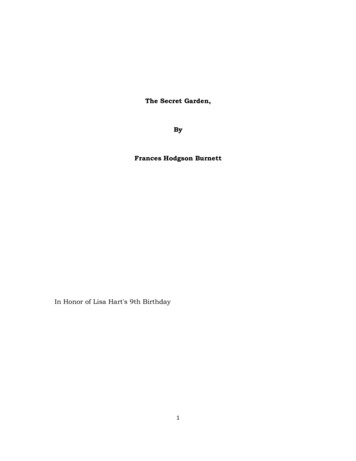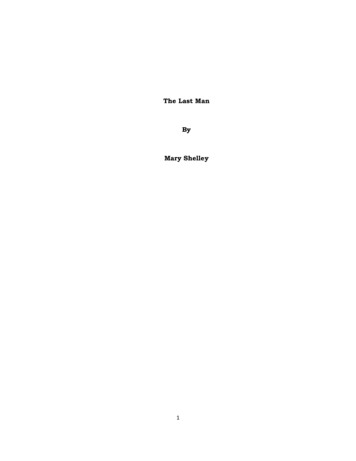
Transcription
HARD TIMESByCharles Dickens
BOOK THE FIRSTSOWINGChapter 1The One Thing Needful‘NOW, what I want is, Facts. Teach these boys and girls nothing butFacts. Facts alone are wanted in life. Plant nothing else, and root outeverything else. You can only form the minds of reasoning animalsupon Facts: nothing else will ever be of any service to them. This isthe principle on which I bring up my own children, and this is theprinciple on which I bring up these children. Stick to Facts, sir!’The scene was a plain, bare, monotonous vault of a school-room, andthe speaker’s square forefinger emphasized his observations byunderscoring every sentence with a line on the schoolmaster’s sleeve.The emphasis was helped by the speaker’s square wall of a forehead,which had his eyebrows for its base, while his eyes found commodiouscellarage in two dark caves, overshadowed by the wall. The emphasiswas helped by the speaker’s mouth, which was wide, thin, and hardset. The emphasis was helped by the speaker’s voice, which wasinflexible, dry, and dictatorial. The emphasis was helped by thespeaker’s hair, which bristled on the skirts of his bald head, aplantation of firs to keep the wind from its shining surface, all coveredwith knobs, like the crust of a plum pie, as if the head had scarcelywarehouse-room for the hard facts stored inside. The speaker’sobstinate carriage, square coat, square legs, square shoulders, - nay,his very neckcloth, trained to take him by the throat with anunaccommodating grasp, like a stubborn fact, as it was, - all helpedthe emphasis.‘In this life, we want nothing but Facts, sir; nothing but Facts!’The speaker, and the schoolmaster, and the third grown personpresent, all backed a little, and swept with their eyes the inclinedplane of little vessels then and there arranged in order, ready to haveimperial gallons of facts poured into them until they were full to thebrim.
Chapter 2Murdering The InnocentsTHOMAS GRADGRIND, sir. A man of realities. A man of facts andcalculations. A man who proceeds upon the principle that two and twoare four, and nothing over, and who is not to be talked into allowingfor anything over. Thomas Gradgrind, sir - peremptorily Thomas Thomas Gradgrind. With a rule and a pair of scales, and themultiplication table always in his pocket, sir, ready to weigh andmeasure any parcel of human nature, and tell you exactly what itcomes to. It is a mere question of figures, a case of simple arithmetic.You might hope to get some other nonsensical belief into the head ofGeorge Gradgrind, or Augustus Gradgrind, or John Gradgrind, orJoseph Gradgrind (all supposititious, non-existent persons), but intothe head of Thomas Gradgrind - no, sir!In such terms Mr. Gradgrind always mentally introduced himself,whether to his private circle of acquaintance, or to the public ingeneral. In such terms, no doubt, substituting the words ‘boys andgirls,’ for ‘sir,’ Thomas Gradgrind now presented Thomas Gradgrind tothe little pitchers before him, who were to be filled so full of facts.Indeed, as he eagerly sparkled at them from the cellarage beforementioned, he seemed a kind of cannon loaded to the muzzle withfacts, and prepared to blow them clean out of the regions of childhoodat one discharge. He seemed a galvanizing apparatus, too, chargedwith a grim mechanical substitute for the tender young imaginationsthat were to be stormed away.‘Girl number twenty,’ said Mr. Gradgrind, squarely pointing with hissquare forefinger, ‘I don’t know that girl. Who is that girl?’‘Sissy Jupe, sir,’ explained number twenty, blushing, standing up,and curtseying.‘Sissy is not a name,’ said Mr. Gradgrind. ‘Don’t call yourself Sissy.Call yourself Cecilia.’‘It’s father as calls me Sissy, sir,’ returned the young girl in atrembling voice, and with another curtsey.‘Then he has no business to do it,’ said Mr. Gradgrind. ‘Tell him hemustn’t. Cecilia Jupe. Let me see. What is your father?’‘He belongs to the horse-riding, if you please, sir.’
Mr. Gradgrind frowned, and waved off the objectionable calling withhis hand.‘We don’t want to know anything about that, here. You mustn’t tell usabout that, here. Your father breaks horses, don’t he?’‘If you please, sir, when they can get any to break, they do breakhorses in the ring, sir.’‘You mustn’t tell us about the ring, here. Very well, then. Describeyour father as a horsebreaker. He doctors sick horses, I dare say?’‘Oh yes, sir.’‘Very well, then. He is a veterinary surgeon, a farrier, andhorsebreaker. Give me your definition of a horse.’(Sissy Jupe thrown into the greatest alarm by this demand.)‘Girl number twenty unable to define a horse!’ said Mr. Gradgrind, forthe general behoof of all the little pitchers. ‘Girl number twentypossessed of no facts, in reference to one of the commonest ofanimals! Some boy’s definition of a horse. Bitzer, yours.’The square finger, moving here and there, lighted suddenly on Bitzer,perhaps because he chanced to sit in the same ray of sunlight which,darting in at one of the bare windows of the intensely white-washedroom, irradiated Sissy. For, the boys and girls sat on the face of theinclined plane in two compact bodies, divided up the centre by anarrow interval; and Sissy, being at the corner of a row on the sunnyside, came in for the beginning of a sunbeam, of which Bitzer, being atthe corner of a row on the other side, a few rows in advance, caughtthe end. But, whereas the girl was so dark-eyed and dark-haired, thatshe seemed to receive a deeper and more lustrous colour from thesun, when it shone upon her, the boy was so light-eyed and lighthaired that the self-same rays appeared to draw out of him what littlecolour he ever possessed. His cold eyes would hardly have been eyes,but for the short ends of lashes which, by bringing them intoimmediate contrast with something paler than themselves, expressedtheir form. His short-cropped hair might have been a merecontinuation of the sandy freckles on his forehead and face. His skinwas so unwholesomely deficient in the natural tinge, that he looked asthough, if he were cut, he would bleed white.‘Bitzer,’ said Thomas Gradgrind. ‘Your definition of a horse.’‘Quadruped. Graminivorous. Forty teeth, namely twenty-four grinders,four eye-teeth, and twelve incisive. Sheds coat in the spring; in
marshy countries, sheds hoofs, too. Hoofs hard, but requiring to beshod with iron. Age known by marks in mouth.’ Thus (and muchmore) Bitzer.‘Now girl number twenty,’ said Mr. Gradgrind. ‘You know what a horseis.’She curtseyed again, and would have blushed deeper, if she couldhave blushed deeper than she had blushed all this time. Bitzer, afterrapidly blinking at Thomas Gradgrind with both eyes at once, and socatching the light upon his quivering ends of lashes that they lookedlike the antennae of busy insects, put his knuckles to his freckledforehead, and sat down again.The third gentleman now stepped forth. A mighty man at cutting anddrying, he was; a government officer; in his way (and in most otherpeople’s too), a professed pugilist; always in training, always with asystem to force down the general throat like a bolus, always to beheard of at the bar of his little Public-office, ready to fight all England.To continue in fistic phraseology, he had a genius for coming up to thescratch, wherever and whatever it was, and proving himself an uglycustomer. He would go in and damage any subject whatever with hisright, follow up with his left, stop, exchange, counter, bore hisopponent (he always fought All England) to the ropes, and fall uponhim neatly. He was certain to knock the wind out of common sense,and render that unlucky adversary deaf to the call of time. And he hadit in charge from high authority to bring about the great public-officeMillennium, when Commissioners should reign upon earth.‘Very well,’ said this gentleman, briskly smiling, and folding his arms.‘That’s a horse. Now, let me ask you girls and boys, Would you papera room with representations of horses?’After a pause, one half of the children cried in chorus, ‘Yes, sir!’ Uponwhich the other half, seeing in the gentleman’s face that Yes waswrong, cried out in chorus, ‘No, sir!’ - as the custom is, in theseexaminations.‘Of course, No. Why wouldn’t you?’A pause. One corpulent slow boy, with a wheezy manner of breathing,ventured the answer, Because he wouldn’t paper a room at all, butwould paint it.‘You must paper it,’ said the gentleman, rather warmly.‘You must paper it,’ said Thomas Gradgrind, ‘whether you like it ornot. Don’t tell us you wouldn’t paper it. What do you mean, boy?’
‘I’ll explain to you, then,’ said the gentleman, after another and adismal pause, ‘why you wouldn’t paper a room with representations ofhorses. Do you ever see horses walking up and down the sides ofrooms in reality - in fact? Do you?’‘Yes, sir!’ from one half. ‘No, sir!’ from the other.‘Of course no,’ said the gentleman, with an indignant look at thewrong half. ‘Why, then, you are not to see anywhere, what you don’tsee in fact; you are not to have anywhere, what you don’t have in fact.What is called Taste, is only another name for Fact.’ ThomasGradgrind nodded his approbation.‘This is a new principle, a discovery, a great discovery,’ said thegentleman. ‘Now, I’ll try you again. Suppose you were going to carpet aroom. Would you use a carpet having a representation of flowers uponit?’There being a general conviction by this time that ‘No, sir!’ was alwaysthe right answer to this gentleman, the chorus of NO was very strong.Only a few feeble stragglers said Yes: among them Sissy Jupe.‘Girl number twenty,’ said the gentleman, smiling in the calm strengthof knowledge.Sissy blushed, and stood up.‘So you would carpet your room - or your husband’s room, if you werea grown woman, and had a husband - with representations of flowers,would you?’ said the gentleman. ‘Why would you?’‘If you please, sir, I am very fond of flowers,’ returned the girl.‘And is that why you would put tables and chairs upon them, andhave people walking over them with heavy boots?’‘It wouldn’t hurt them, sir. They wouldn’t crush and wither, if youplease, sir. They would be the pictures of what was very pretty andpleasant, and I would fancy - ‘‘Ay, ay, ay! But you mustn’t fancy,’ cried the gentleman, quite elatedby coming so happily to his point. ‘That’s it! You are never to fancy.’‘You are not, Cecilia Jupe,’ Thomas Gradgrind solemnly repeated, ‘todo anything of that kind.’‘Fact, fact, fact!’ said the gentleman. And ‘Fact, fact, fact!’ repeatedThomas Gradgrind.
‘You are to be in all things regulated and governed,’ said thegentleman, ‘by fact. We hope to have, before long, a board of fact,composed of commissioners of fact, who will force the people to be apeople of fact, and of nothing but fact. You must discard the wordFancy altogether. You have nothing to do with it. You are not to have,in any object of use or ornament, what would be a contradiction infact. You don’t walk upon flowers in fact; you cannot be allowed towalk upon flowers in carpets. You don’t find that foreign birds andbutterflies come and perch upon your crockery; you cannot bepermitted to paint foreign birds and butterflies upon your crockery.You never meet with quadrupeds going up and down walls; you mustnot have quadrupeds represented upon walls. You must use,’ said thegentleman, ‘for all these purposes, combinations and modifications (inprimary colours) of mathematical figures which are susceptible ofproof and demonstration. This is the new discovery. This is fact. Thisis taste.’The girl curtseyed, and sat down. She was very young, and she lookedas if she were frightened by the matter-of-fact prospect the worldafforded.‘Now, if Mr. M’Choakumchild,’ said the gentleman, ‘will proceed to givehis first lesson here, Mr. Gradgrind, I shall be happy, at your request,to observe his mode of procedure.’Mr. Gradgrind was much obliged. ‘Mr. M’Choakumchild, we only waitfor you.’ So, Mr. M’Choakumchild began in his best manner. He andsome one hundred and forty other schoolmasters, had been latelyturned at the same time, in the same factory, on the same principles,like so many pianoforte legs. He had been put through an immensevariety of paces, and had answered volumes of head-breakingquestions. Orthography, etymology, syntax, and prosody, biography,astronomy, geography, and general cosmography, the sciences ofcompound proportion, algebra, land-surveying and levelling, vocalmusic, and drawing from models, were all at the ends of his tenchilled fingers. He had worked his stony way into Her Majesty’s mostHonourable Privy Council’s Schedule B, and had taken the bloom offthe higher branches of mathematics and physical science, French,German, Latin, and Greek. He knew all about all the Water Sheds ofall the world (whatever they are), and all the histories of all thepeoples, and all the names of all the rivers and mountains, and all theproductions, manners, and customs of all the countries, and all theirboundaries and bearings on the two and thirty points of the compass.Ah, rather overdone, M’Choakumchild. If he had only learnt a littleless, how infinitely better he might have taught much more!He went to work in this preparatory lesson, not unlike Morgiana in theForty Thieves: looking into all the vessels ranged before him, one after
another, to see what they contained. Say, good M’Choakumchild.When from thy boiling store, thou shalt fill each jar brim full by-andby, dost thou think that thou wilt always kill outright the robberFancy lurking within - or sometimes only maim him and distort him!
Chapter 3A LoopholeMR. GRADGRIND walked homeward from the school, in a state ofconsiderable satisfaction. It was his school, and he intended it to be amodel. He intended every child in it to be a model - just as the youngGradgrinds were all models.There were five young Gradgrinds, and they were models every one.They had been lectured at, from their tenderest years; coursed, likelittle hares. Almost as soon as they could run alone, they had beenmade to run to the lecture-room. The first object with which they hadan association, or of which they had a remembrance, was a largeblack board with a dry Ogre chalking ghastly white figures on it.Not that they knew, by name or nature, anything about an Ogre Factforbid! I only use the word to express a monster in a lecturing castle,with Heaven knows how many heads manipulated into one, takingchildhood captive, and dragging it into gloomy statistical dens by thehair.No little Gradgrind had ever seen a face in the moon; it was up in themoon before it could speak distinctly. No little Gradgrind had everlearnt the silly jingle, Twinkle, twinkle, little star; how I wonder whatyou are! No little Gradgrind had ever known wonder on the subject,each little Gradgrind having at five years old dissected the Great Bearlike a Professor Owen, and driven Charles’s Wain like a locomotiveengine-driver. No little Gradgrind had ever associated a cow in a fieldwith that famous cow with the crumpled horn who tossed the dog whoworried the cat who killed the rat who ate the malt, or with that yetmore famous cow who swallowed Tom Thumb: it had never heard ofthose celebrities, and had only been introduced to a cow as agraminivorous ruminating quadruped with several stomachs.To his matter-of-fact home, which was called Stone Lodge, Mr.Gradgrind directed his steps. He had virtually retired from thewholesale hardware trade before he built Stone Lodge, and was nowlooking about for a suitable opportunity of making an arithmeticalfigure in Parliament. Stone Lodge was situated on a moor within amile or two of a great town - called Coketown in the present faithfulguide-book.A very regular feature on the face of the country, Stone Lodge was. Notthe least disguise toned down or shaded off that uncompromising factin the landscape. A great square house, with a heavy porticodarkening the principal windows, as its master’s heavy browsovershadowed his eyes. A calculated, cast up, balanced, and proved
house. Six windows on this side of the door, six on that side; a total oftwelve in this wing, a total of twelve in the other wing; four-and-twentycarried over to the back wings. A lawn and garden and an infantavenue, all ruled straight like a botanical account- book. Gas andventilation, drainage and water-service, all of the primest quality. Ironclamps and girders, fire-proof from top to bottom; mechanical lifts forthe housemaids, with all their brushes and brooms; everything thatheart could desire.Everything? Well, I suppose so. The little Gradgrinds had cabinets invarious departments of science too. They had a little conchologicalcabinet, and a little metallurgical cabinet, and a little mineralogicalcabinet; and the specimens were all arranged and labelled, and thebits of stone and ore looked as though they might have been brokenfrom the parent substances by those tremendously hard instrumentstheir own names; and, to paraphrase the idle legend of Peter Piper,who had never found his way into their nursery, If the greedy littleGradgrinds grasped at more than this, what was it for good graciousgoodness’ sake, that the greedy little Gradgrinds grasped it!Their father walked on in a hopeful and satisfied frame of mind. Hewas an affectionate father, after his manner; but he would probablyhave described himself (if he had been put, like Sissy Jupe, upon adefinition) as ‘an eminently practical’ father. He had a particular pridein the phrase eminently practical, which was considered to have aspecial application to him. Whatsoever the public meeting held inCoketown, and whatsoever the subject of such meeting, someCoketowner was sure to seize the occasion of alluding to his eminentlypractical friend Gradgrind. This always pleased the eminentlypractical friend. He knew it to be his due, but his due was acceptable.He had reached the neutral ground upon the outskirts of the town,which was neither town nor country, and yet was either spoiled, whenhis ears were invaded by the sound of music. The clashing andbanging band attached to the horse-riding establishment, which hadthere set up its rest in a wooden pavilion, was in full bray. A flag,floating from the summit of the temple, proclaimed to mankind that itwas ‘Sleary’s Horse-riding’ which claimed their suffrages. Slearyhimself, a stout modern statue with a money-box at its elbow, in anecclesiastical niche of early Gothic architecture, took the money. MissJosephine Sleary, as some very long and very narrow strips of printedbill announced, was then inaugurating the entertainments with hergraceful equestrian Tyrolean flower-act. Among the other pleasing butalways strictly moral wonders which must be seen to be believed,Signor Jupe was that afternoon to ‘elucidate the divertingaccomplishments of his highly trained performing dog Merrylegs.’ Hewas also to exhibit ‘his astounding feat of throwing seventy-fivehundred-weight in rapid succession backhanded over his head, thus
forming a fountain of solid iron in mid-air, a feat never beforeattempted in this or any other country, and which having elicited suchrapturous plaudits from enthusiastic throngs it cannot be withdrawn.’The same Signor Jupe was to ‘enliven the varied performances atfrequent intervals with his chaste Shaksperean quips and retorts.’Lastly, he was to wind them up by appearing in his favouritecharacter of Mr. William Button, of Tooley Street, in ‘the highly noveland laughable hippo- comedietta of The Tailor’s Journey to Brentford.’Thomas Gradgrind took no heed of these trivialities of course, butpassed on as a practical man ought to pass on, either brushing thenoisy insects from his thoughts, or consigning them to the House ofCorrection. But, the turning of the road took him by the back of thebooth, and at the back of the booth a number of children werecongregated in a number of stealthy attitudes, striving to peep in atthe hidden glories of the place.This brought him to a stop. ‘Now, to think of these vagabonds,’ saidhe, ‘attracting the young rabble from a model school.’A space of stunted grass and dry rubbish being between him and theyoung rabble, he took his eyeglass out of his waistcoat to look for anychild he knew by name, and might order off. Phenomenon almostincredible though distinctly seen, what did he then behold but hisown metallurgical Louisa, peeping with all her might through a hole ina deal board, and his own mathematical Thomas abasing himself onthe ground to catch but a hoof of the graceful equestrian Tyroleanflower-act!Dumb with amazement, Mr. Gradgrind crossed to the spot where hisfamily was thus disgraced, laid his hand upon each erring child, andsaid:‘Louisa!! Thomas!!’Both rose, red and disconcerted. But, Louisa looked at her father withmore boldness than Thomas did. Indeed, Thomas did not look at him,but gave himself up to be taken home like a machine.‘In the name of wonder, idleness, and folly!’ said Mr. Gradgrind,leading each away by a hand; ‘what do you do here?’‘Wanted to see what it was like,’ returned Louisa, shortly.‘What it was like?’‘Yes, father.’
There was an air of jaded sullenness in them both, and particularly inthe girl: yet, struggling through the dissatisfaction of her face, therewas a light with nothing to rest upon, a fire with nothing to burn, astarved imagination keeping life in itself somehow, which brightenedits expression. Not with the brightness natural to cheerful youth, butwith uncertain, eager, doubtful flashes, which had something painfulin them, analogous to the changes on a blind face groping its way.She was a child now, of fifteen or sixteen; but at no distant day wouldseem to become a woman all at once. Her father thought so as helooked at her. She was pretty. Would have been self-willed (he thoughtin his eminently practical way) but for her bringing-up.‘Thomas, though I have the fact before me, I find it difficult to believethat you, with your education and resources, should have broughtyour sister to a scene like this.’‘I brought him, father,’ said Louisa, quickly. ‘I asked him to come.’‘I am sorry to hear it. I am very sorry indeed to hear it. It makesThomas no better, and it makes you worse, Louisa.’She looked at her father again, but no tear fell down her cheek.‘You! Thomas and you, to whom the circle of the sciences is open;Thomas and you, who may be said to be replete with facts; Thomasand you, who have been trained to mathematical exactness; Thomasand you, here!’ cried Mr. Gradgrind. ‘In this degraded position! I amamazed.’‘I was tired, father. I have been tired a long time,’ said Louisa.‘Tired? Of what?’ asked the astonished father.‘I don’t know of what - of everything, I think.’‘Say not another word,’ returned Mr. Gradgrind. ‘You are childish. Iwill hear no more.’ He did not speak again until they had walked somehalf-a-mile in silence, when he gravely broke out with: ‘What wouldyour best friends say, Louisa? Do you attach no value to their goodopinion? What would Mr. Bounderby say?’ At the mention of thisname, his daughter stole a look at him, remarkable for its intense andsearching character. He saw nothing of it, for before he looked at her,she had again cast down her eyes!‘What,’ he repeated presently, ‘would Mr. Bounderby say?’ All the wayto Stone Lodge, as with grave indignation he led the two delinquents
home, he repeated at intervals ‘What would Mr. Bounderby say?’ - asif Mr. Bounderby had been Mrs. Grundy.
Chapter 4Mr. BounderbyNOT being Mrs. Grundy, who was Mr. Bounderby?Why, Mr. Bounderby was as near being Mr. Gradgrind’s bosom friend,as a man perfectly devoid of sentiment can approach that spiritualrelationship towards another man perfectly devoid of sentiment. Sonear was Mr. Bounderby - or, if the reader should prefer it, so far off.He was a rich man: banker, merchant, manufacturer, and what not. Abig, loud man, with a stare, and a metallic laugh. A man made out ofa coarse material, which seemed to have been stretched to make somuch of him. A man with a great puffed head and forehead, swelledveins in his temples, and such a strained skin to his face that itseemed to hold his eyes open, and lift his eyebrows up. A man with apervading appearance on him of being inflated like a balloon, andready to start. A man who could never sufficiently vaunt himself aself-made man. A man who was always proclaiming, through thatbrassy speaking-trumpet of a voice of his, his old ignorance and hisold poverty. A man who was the Bully of humility.A year or two younger than his eminently practical friend, Mr.Bounderby looked older; his seven or eight and forty might have hadthe seven or eight added to it again, without surprising anybody. Hehad not much hair. One might have fancied he had talked it off; andthat what was left, all standing up in disorder, was in that conditionfrom being constantly blown about by his windy boastfulness.In the formal drawing-room of Stone Lodge, standing on thehearthrug, warming himself before the fire, Mr. Bounderby deliveredsome observations to Mrs. Gradgrind on the circumstance of its beinghis birthday. He stood before the fire, partly because it was a coolspring afternoon, though the sun shone; partly because the shade ofStone Lodge was always haunted by the ghost of damp mortar; partlybecause he thus took up a commanding position, from which tosubdue Mrs. Gradgrind.‘I hadn’t a shoe to my foot. As to a stocking, I didn’t know such a thingby name. I passed the day in a ditch, and the night in a pigsty. That’sthe way I spent my tenth birthday. Not that a ditch was new to me, forI was born in a ditch.’Mrs. Gradgrind, a little, thin, white, pink-eyed bundle of shawls, ofsurpassing feebleness, mental and bodily; who was always takingphysic without any effect, and who, whenever she showed a symptom
of coming to life, was invariably stunned by some weighty piece of facttumbling on her; Mrs. Gradgrind hoped it was a dry ditch?‘No! As wet as a sop. A foot of water in it,’ said Mr. Bounderby.‘Enough to give a baby cold,’ Mrs. Gradgrind considered.‘Cold? I was born with inflammation of the lungs, and of everythingelse, I believe, that was capable of inflammation,’ returned Mr.Bounderby. ‘For years, ma’am, I was one of the most miserable littlewretches ever seen. I was so sickly, that I was always moaning andgroaning. I was so ragged and dirty, that you wouldn’t have touchedme with a pair of tongs.’Mrs. Gradgrind faintly looked at the tongs, as the most appropriatething her imbecility could think of doing.‘How I fought through it, I don’t know,’ said Bounderby. ‘I wasdetermined, I suppose. I have been a determined character in laterlife, and I suppose I was then. Here I am, Mrs. Gradgrind, anyhow,and nobody to thank for my being here, but myself.’Mrs. Gradgrind meekly and weakly hoped that his mother ‘My mother? Bolted, ma’am!’ said Bounderby.Mrs. Gradgrind, stunned as usual, collapsed and gave it up.‘My mother left me to my grandmother,’ said Bounderby; ‘and,according to the best of my remembrance, my grandmother was thewickedest and the worst old woman that ever lived. If I got a little pairof shoes by any chance, she would take ‘em off and sell ‘em for drink.Why, I have known that grandmother of mine lie in her bed and drinkher four-teen glasses of liquor before breakfast!’Mrs. Gradgrind, weakly smiling, and giving no other sign of vitality,looked (as she always did) like an indifferently executed transparencyof a small female figure, without enough light behind it.‘She kept a chandler’s shop,’ pursued Bounderby, ‘and kept me in anegg-box. That was the cot of my infancy; an old egg-box. As soon as Iwas big enough to run away, of course I ran away. Then I became ayoung vagabond; and instead of one old woman knocking me aboutand starving me, everybody of all ages knocked me about and starvedme. They were right; they had no business to do anything else. I was anuisance, an incumbrance, and a pest. I know that very well.’
His pride in having at any time of his life achieved such a great socialdistinction as to be a nuisance, an incumbrance, and a pest, was onlyto be satisfied by three sonorous repetitions of the boast.‘I was to pull through it, I suppose, Mrs. Gradgrind. Whether I was todo it or not, ma’am, I did it. I pulled through it, though nobody threwme out a rope. Vagabond, errand-boy, vagabond, labourer, porter,clerk, chief manager, small partner, Josiah Bounderby of Coketown.Those are the antecedents, and the culmination. Josiah Bounderby ofCoketown learnt his letters from the outsides of the shops, Mrs.Gradgrind, and was first able to tell the time upon a dial-plate, fromstudying the steeple clock of St. Giles’s Church, London, under thedirection of a drunken cripple, who was a convicted thief, and anincorrigible vagrant. Tell Josiah Bounderby of Coketown, of yourdistrict schools and your model schools, and your training schools,and your whole kettle-of-fish of schools; and Josiah Bounderby ofCoketown, tells you plainly, all right, all correct - he hadn’t suchadvantages - but let us have hard-headed, solid-fisted people - theeducation that made him won’t do for everybody, he knows well - suchand such his education was, however, and you may force him toswallow boiling fat, but you shall never force him to suppress the factsof his life.’Being heated when he arrived at this climax, Josiah Bounderby ofCoketown stopped. He stopped just as his eminently practical friend,still accompanied by the two young culprits, entered the room. Hiseminently practical friend, on seeing him, stopped also, and gaveLouisa a reproachful look that plainly said, ‘Behold your Bounderby!’‘Well!’ blustered Mr. Bounderby, ‘what’s the matter? What is youngThomas in the dumps about?’He spoke of young Thomas, but he looked at Louisa.‘We were peeping at the circus,’ muttered Louisa, haughtily, withoutlifting up her eyes, ‘and father caught us.’‘And, Mrs. Gradgrind,’ said her husband in a lofty manner,
BOOK THE FIRST SOWING Chapter 1 The One Thing Needful ‘NOW, what I want is, Facts. Teach these boys and girls nothing but Facts. Facts alone are wanted in life. Plant nothing else, and root out everything else. You can only form the minds of reasoning animals upon Facts:










